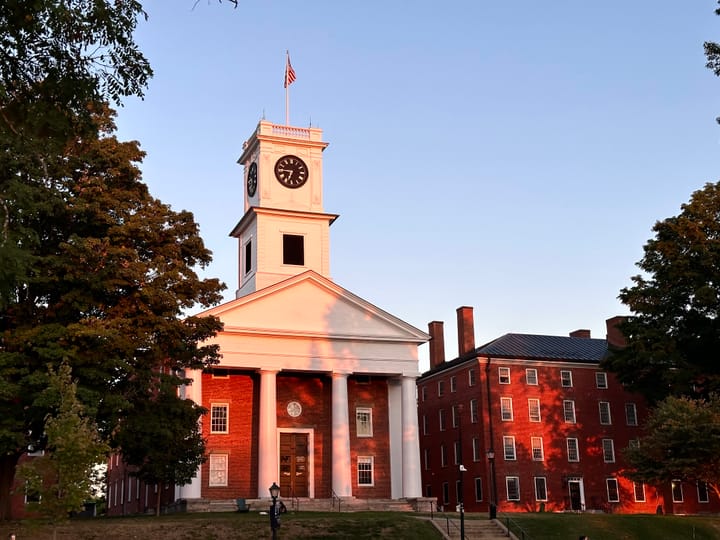ACEMS To Resume EMT Services on March 1
Amherst College Emergency Medical Services (ACEMS) recently announced that ACEMS will be resuming service starting on March 1 after a fall semester off-service due to inadequate resources and staff. Armed with new protocols developed for Covid-19 safety, ACEMS hopes to address the gap left without them in the student experience and allow students to feel safer on campus.
ACEMS is a student-run and student-staffed volunteer organization that provides 24/7 basic life support in response to medical emergencies on campus. Students complete a training course to become EMTs and move up ACEMS’ ranks as they gain more experience. ACEMS members have the highest level of medical training out of anyone on campus outside of the Health Center, and provide a service that students feel more comfortable calling on than ACPD, AFD or the college administration when they need help.
With mainly first-years and sophomores being invited back to campus in the fall, ACEMS board members reported that the biggest reason for not running last semester was an inability to meet staffing needs. “Most of our sophomores are Med-13’s, which is our probationary rank, so we didn’t have the quality of EMTs necessary to confidently run,” explained Lani Uyeno ’23, director of outreach for ACEMS.
“We didn’t have enough of our highest ranking members, who have the most experience and who lead calls, interact with patients and possess the most knowledge,” added Thomas D’Aprile ’21, chief of operations for ACEMS. “We didn’t want to jeopardize care [by] using EMTs that we didn’t think were ready to be running alone quite yet.”
With more juniors and seniors on campus this semester, ACEMS has enough upperclassmen members to staff a squad. The other major challenge has been adapting ACEMS to a Covid-19 environment, which the board has worked tirelessly with the administration to do. To protect the safety of squad members and the campus community, for instance, ACEMS will be dispatched for all physical and mental health emergencies except suspected Covid-19 cases, which Health Services will handle.
In addition, all ACEMS members who are on-call will be equipped with proper personal protective equipment (PPE), including N95 masks, gloves and face shields. All equipment used on a call will be thoroughly sanitized afterwards. To minimize the number of people in a room at any given time, as well as limit direct contact with patients, ACEMS has shifted from their typical three-person teams to two-person teams with an additional squad member staged outside the room in an observational role.
“There’s been a lot of work that has gone into resuming service,” said D’Aprile. “And the difficulties come down to really trying to plan for things that you don’t expect and having a lot of contingency plans in place. So we[’ve] worked to have parameters that tell us to suspend service if we see ourselves hav[ing] staffing issues, or we see that ACEMS is contributing to virus spread on campus.”
In the event that a patient or ACEMS member tests positive for Covid-19, ACEMS members will follow the college’s current quarantine and isolation policy. While the board was initially optimistic that it would be able to secure vaccinations for all members before service began, it has been unable to do so due to regulatory hurdles. Members will be allowed to leave campus to get vaccinated, however, as vaccines become available.
Andrés Pena Tauber ’23, an ACEMS member who was able to get his first shot at UMass over the January term, said that he feels more at ease working because of it. “That was my main worry, that I would either act as a vector for infection, or I would get infected myself because of my contact with everyone,” he said. “But I wouldn’t say that that’s my main worry now.”
On the whole, members expressed appreciation for the thought and care that has gone into communicating the new protocols and ensuring that squad members feel safe. “Our e-board has been in constant communication with the administration and [Medical Operator] Dr. [Emily] Jones on following health guidelines, and as members not on e-board, we are very much in the loop,” said Stephanie Zovich ’23, who will be working this semester.
“All current squad members on campus this semester attended a comprehensive informational and training session over Zoom recently that allowed students to ask the board questions about safety and operations,” added Maggie Drew ’22, an ACEMS EMT. “Ultimately, every squad member is able to decide for themselves if they feel comfortable participating this semester or would prefer to take the semester off due to safety concerns.”
Board and squad members alike cited the importance of ACEMS’ service as motivation for resuming service this semester. “I heard in the fall there were a lot of scenarios in which students wanted to call ACEMS, but they knew that ACEMS wasn’t running,” Uyeno said. “It put students in more of a dangerous situation, since it was just other students taking care of each other to the best of their abilities.”
“People always have medical emergencies, and with mental health being the way it is nowadays, people are probably partaking in more drugs than usual, probably being less responsible with themselves,” added Pena Tauber. “I think it’s really important for us to be here just to provide that safety net, so [students] don’t feel that there’s a barrier to calling for help.”
With a commitment to delivering care to the student body, ACEMS is ready to get back to work. “If you need help, call ACEMS,” said Zovich. “Patient help is the priority, so that is what we are focused on this semester.”
“We’re so excited to start and help the community. We’re getting ready, we’re prepared and it’s going to be a great semester,” she concluded.





Comments ()